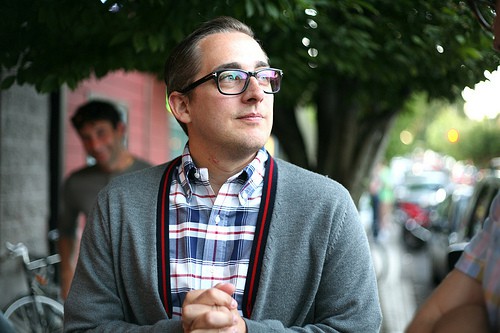One of my favorite signs from the Occupy Movement last year went something like this: “I’ll believe corporations are people when Texas executes one.” So pithy! So clever! So iconoclastic! All at once, it lampoons the legal fiction (yes, this is actually the technical term for this sort of thing) underlying the unpopular recent Citizens United decision, as well as making a jab at the fact that we1 often treat actual human persons worse than we treat these corporate persons. When I saw the sign, I had an overwhelming urge to nod knowingly and compliment myself on understanding the irony that we would never do to imaginary corporate persons what we still perpetrate on flesh and blood human beings.
Well, my smugness took a hit a few weeks ago when I learned about the existence of Mike Merrill, a real flesh and blood human being who is a corporation. No, not the head of a corporation. Not a member of a corporation. He himself is the corporation.
Based on the inspiration of two of his passions—creative internet startup projects and crowdsourced funding/decision-making – he came up with the idea of selling shares in himself. Others had toyed with similar ideas before, allowing people to invest in them as up-and-comers (maybe students trying to pay tuition, minor leaguers looking for spending cash, or even established celebrities receiving a sort of advance on future royalties) in order to share in any future earnings later. But Merrill was willing to take it to the next step, allowing people to buy shares in him as a commodity. If people’s desire to own a piece of KMikeyM (Merril’s corporate name plays on the fact that Kenneth is his legal first name) goes up, then the price of their shares go up. If not… well, even gold is having a tough time of it these days.
But ownership of Mike Merrill comes with a less tangible compensation as well: the ability to vote on just about every decision that he makes. Merrill’s first proposals to his new-found stockholders came off as distinctly tentative: his descriptions are perfunctory, his recommendations remain explicitly rooted in his personal preference, and the projects proposed seem largely innocuous. Should KMikeyM begin taking on projects? Should he make a micro loan to a chicken farmer in Rwanda? Should he release a promotional video about the corporation?
About six months after his launch, however, one of Merrill’s stockholders (a long-term friend) protested when KMikeyM moved in with his girlfriend of 2.5 years without asking for a shareholder vote first. After all, this decision entailed a significant time commitment, affecting his ability to pursue the projects that had been corporately decided upon. All of this led Merrill to reconceptualize the whole idea.
He began to seek shareholder approval for every personal decision of significance that he made. His principle became: If he would normally have asked his friends’ opinions about a decision, now he would ask his investors to make the decision by a shareholder vote. Using this method, Merrill has registered as a Republican (he was a Democrat), made fashion commitments (he wears only Brooks Brothers, with a Nike exception for athletic wear), has become vegetarian and then pescetarian (he had been quite the carnivore), has attempted polyphasic sleeping (who doesn’t enjoy sleeping the whole night through?), and decided not to get a vasectomy.
You might be saying to yourself: “A vasectomy? He asked a collection of friends and strangers to decide whether or not having children would even be a possibility? That’s just wrong.” Yes, true. I would (and will) argue that these kinds of decisions are not up for debate – just be patient and bear with me. Why? Because it is also instructive to follow Mr. Merrill along for the ride just for a little while.
He is not, in fact, naïve about many of the implications of what he is doing. After a series of features in Wired, The Atlantic, and the “Today” show drew attention – and a significant amount of criticism – Merrill offered a series of replies to common lines of attack. He openly acknowledged that doing things like making his love life subject to a series of shareholder votes could get him stuck in a relationship he was not happy with. But his commitment to the larger project of allowing people to have a say in his life makes him confident that he can bear with such possibilities. He genuinely seems to enjoy what he calls a “wonderful strategic game with real stakes.”2
As a man who has found himself lying awake many a night grappling with the consequences of a decision made a long time ago to vow myself to perpetual poverty, chastity, and obedience, I can hardly fault Merrill for making a commitment that may not always work out to be the most pleasant of alternatives. It is one of the fallacies of our age that we should avoid commitment because it might someday limit our capability to chase happiness in some other place.
But Merrill is not simply looking for the thrill of a game with Shirley Jackson-like stakes. Even though his shareholders may lead him to some dead-ends, Merrill points out that the same is true of his own choices. Spreading out the decision-making among so many helps to iron out the imperfections which he might otherwise be blinded to. Insight, objectivity, creativity – the thinking goes – the more people and more perspectives you have, the more likely the chances of all these things happening. More than just a process of adding the excitement of the unknown into his life, Merrill really believes that asking others (including strangers) helps make his decision-making better. Seems plausible enough…
Nor is what he is doing as far from our common experience as it seems at first. Merrill insightfully points out that we all subconsciously use systems of decision-making provided to us by our societies. He argues, “As much as we like to think we are unique special snowflakes the truth is we are very shaped by our community. This is a good thing!” Wearing pants today, yielding to the first car at a stop sign, choosing the “correct” urinal… all of these are decisions which I make with a minimum of personal input – nor would making idiosyncratic, personal choices make my life any more fulfilling. (Phrases never to say to yourself: “I think today is a no pants day!”)
Far from being an outlier, I would make the case that Merrill is the Man of His Time. Who better captures the reality of our crowdsourcing, startup obsessed, socially-networked world than the man who allows strangers with venture capital to decide whether he should grow a “winter mustache”? Alas, this proposal was defeated, but not before raising the delicious question of whether I should have an IPO for my beard. There is a cause worth backing! (I suspect that a few of the anti-beard partisans in my life would pay a pretty penny to have creative control over my facial hair.) He reveals to us some of the laudable qualities of 21st century interaction: democratic decision making, openness to widespread collaboration, and a desire to be creative. He also challenges us to acknowledge how dependent we are upon the many communities around us (and how that is not necessarily a negative).
Not all aspects of our age are virtuous, however. Perhaps most obviously, by corporatizing himself, Merrill has followed our American habit of letting money drive our decision making. A balanced social order certainly has a place for open markets and the search for private profit, but these values must always come a distant second to deeper concerns: is this social order one which promotes and preserves human dignity? Does it acknowledge that all decisions must be subject to moral criteria? Are all people accorded the opportunity to ground themselves in God and to experience both giving and receiving love in a community? A social, cultural, or economic system must always satisfy conditions such as these before questions of personal profit even become relevant. It is never enough to simply answer the question: Does this act make economic sense? One must first also answer: Does it make moral sense?
Properly understood, KMikeyM itself demonstrates the need for such moral constraints on market activities. Early in 2012, his shareholders passed a vote to authorize the dispersal of Michael Merrill’s $100,000 life insurance policy among the shareholders in the case of his demise. That meant a payout of over twice as much as the current price of a share on the market. They would make more money if Merrill died than if they sold their shares. There was no economic incentive for the shareholders to not take fish off of Merrill’s menu and substitute it for arsenic. No economic incentive, but there were legal and moral incentives.
And this is precisely the point: legal and moral considerations must always constrain economic decision making, not the other way around. Even Merrill himself appreciates this (at least to some degree). He believes a corporation should come together for a specific task, not merely to accumulate money.3 However, he grants a little too readily that monetary gain is the best criteria for success.
We know that a human person is not the kind of being that one can own, whether individually – as a master owns a slave; or corporately – as shareholders own a company. But in the case of slavery, people are bought and sold against their own will. With Mike Merrill, he has put himself up for sale. Does that give us license to treat him as a commodity? Does one’s own worth really come from adding shareholder value, as Merrill’s corporate project suggests?
This project shows us a pretty miserable, inhuman way of living. However, his project leaves me with a lot of material to think about. For example, he pushes us to reflect on the boundaries of our networked society. Or, value – my own, as well as everyone else’s. Human life is far beyond monetary value, but sometimes we commodify one another. Mike Merrill prompts me to consider much more deeply my interconnectedness with others in my life, and my ability to recognize and contribute to the beauty of the world.
If you had the opportunity, would you buy a share in KMikeyM? Vow of poverty aside, I know I couldn’t afford it. Buying a share in another person comes at both too low and too high a price for me. Neither Mike Merrill, nor you, nor I are for sale. The only person he belongs to – that any of us belong to – is God.
— — — — — —
- While the slogan singles out Texas for the sake of additional vim (it has performed well over 1/3 of all the U.S. executions since 1976), we must acknowledge that this problem extends throughout our country, both in state sponsored executions and many other ways. ↩
- http://urbanhonking.com/kmikeym/ ↩
- http://www.theglobeandmail.com/life/what-if-a-man-sold-public-shares-in-himself/article10821504/ ↩





